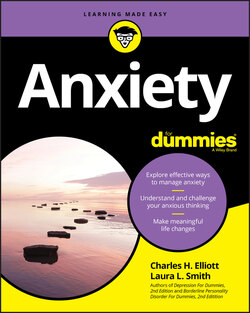Читать книгу Anxiety For Dummies - W. Doyle Gentry, Laura L. Smith - Страница 34
Avoiding people
ОглавлениеPeople who are socially phobic fear exposure to public scrutiny. These people dread performing, speaking, going to parties, meeting new people, entering groups, using the telephone, writing a check in front of others, eating in public, and/or interacting with those in authority. They see these situations as painful because they expect to receive humiliating or shameful judgments from others.
Social phobics believe they’re somehow defective and inadequate; they assume they’ll bungle their lines, spill their drinks, shake hands with clammy palms, or commit any number of social faux pas and thus embarrass themselves. Ironically, because they are so anxious, they actually do what they fear. Shaky, sweaty hands spill drinks. Lack of eye contact turns people away. They worry about what others are thinking about them — so much that they don’t listen well enough to keep a conversation going.
Everyone feels uncomfortable or nervous from time to time, especially in new situations. For example, if you’ve been experiencing social fears about a challenging new situation, that may be normal. A short-term fear of socializing may be a temporary reaction to a new stress such as moving to a new neighborhood or getting a new job. However, you may have a problem with social anxiety if you experience the following symptoms for a prolonged period:
You fear situations with unfamiliar people or ones where you may be observed or evaluated in some way.
When forced into an uncomfortable social situation, your anxiety increases powerfully. For example, if you fear public speaking, your voice shakes, and your knees tremble the moment that you start your speech.
You realize that your fear is greater than the situation really warrants. For example, if you fear meeting new people, logically you know nothing horrible will happen, but tidal waves of adrenaline and fearful anticipation course through your veins.
You avoid fearful situations as much as you can or endure them only with great distress. Because of your fears, you may miss a variety of events you’d otherwise like to go to (for example, family gatherings, work opportunities, or parties).
Check out the following prime example of a social anxiety and see whether any of it seems familiar.
Maurice, a 35-year-old bachelor, wants a serious relationship. Women consider him attractive, and he has a well-paying job. Maurice’s friends invite him to parties and other social events in an effort to set him up with women. Unfortunately, he detests the idea of going. Maurice conjures up a number of good excuses for backing out. However, his desire to meet potential dates eventually wins. Whenever he imagines scenes of meeting women, he feels intense, anxious anticipation.
When Maurice arrives at the party, he heads to the bar to quell his mounting anxiety. His hands shake as he picks up his first drink. Quickly downing the drink, he orders another in hopes of numbing his emotions. After an hour of nonstop drinking, he feels much braver. He interrupts a cluster of attractive women and spews out a string of jokes that he has memorized for the occasion. Then he approaches various women throughout the night, sometimes making flirtatious, suggestive comments. His silly, drunken behavior doesn’t get him any dates. The following day, he’s embarrassed and ashamed.
